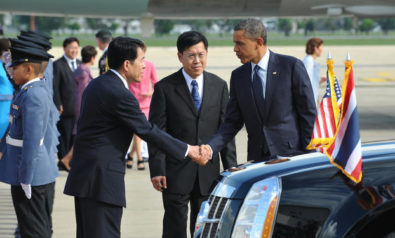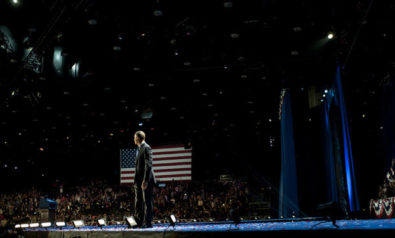As Obama prepares for another four years in the White House, questions arise as to which issues will define the president’s domestic agenda during his second term in office.
Since his first electoral victory in 2009, die-hard Obama supporters have become a rare breed in the US. Barack Obama came to power amidst a flurry of elation and hope for a radically different American Dream. Four years later, the tears of joy have dried and the words promising change have all but lost their power over the hearts of most Americans. Inevitably, the president’s second term has been greeted with far less enthusiasm than the first. Obama is not first, and nor will he likely be the last, to live out this trend.
A second term in office may mean many things for the first US president of African descent. Gun control, immigration reform, and climate change are among the main contenders for this term’s top issues. However, as different sectors of society squabble over which topics deserve priority, increasing polarization and stalemate on important legislative actions may very well define the president’s next four years on the public’s payroll.
The Big Guns
With Obamacare signed into law in 2010, and the recent fiscal cliff negotiations finalized between Vice-President Joe Biden and senior Republican Mitch McConnell, allowing a deal to be approved by Congress, Obama is starting his second term with new projects on the horizon. The recent school shooting at the Sandy Hook elementary in Newtown, Connecticut, spurred nation-wide outrage and disgust at the lack of gun control and background checks involved in gun purchases. Shortly after the tragedy, in which 20 children and 6 adults were gunned down with two assault weapons, Obama pledged to work on legislation that would tighten gun control across the country. Although previous presidents Bill Clinton and George W. Bush also promised such actions following similar disasters, no major bill was passed. As the US public awaits concrete action in the wake of the Newtown massacre, a glimmer of hope may appear with the administration preparing to propose major legislation to expand background checks for gun purchases, a ban on assault weapons and new limits on gun imports.
Jumping the Fence on Immigration
Asides gun control, according to White House Spokesperson Jay Carney, the president’s State of the Union address on February 12 will likely mention immigration reform as a high-priority issue. A new administrative program launched in 2012 prevented the deportation of 102,965 undocumented immigrants under the Dream Act. Providing work permits, stopping short of citizenship, the Act is the first step in the reform of tough immigration and deportation practices in the US. With the president searching for a second term legacy, continuing to develop policy to strengthen and expand the Dream Act would restore much confidence among leftist segments of society, and especially amongst portions of the Latino population.
Raising the Tide on Climate Change
According to an interview with TIME Magazine, climate change will also be at the top of Obama’s hit list this term. However, the president’s track record does not inspire confidence. At the recent climate talks in Doha, Qatar, the world anticipated a different tone from the oft-criticized US nonchalance toward climate fears. In the wake of Hurricane Sandy, Obama had addressed climate change as a major concern and indeed showed a will to tackle the issue with the immediacy it deserves. However, hopes were once more dashed as the US position in Doha remained fixed, refusing to compromise on any key points.
In addition, environmental activists in the US have been outraged at the president’s lax approach to ‘Fracking’, the hydraulic fracturing of rocks formations to extract oil and gas. In contradiction to environmentally friendly policies, Obama has refused to implement a moratorium on the practice and has recently signed legislation that allows companies to extract without declaring harmful chemicals used in the process, until after extraction. Obama’s promise to leverage more solar power usage in certain southern and western states may sway some activists. But if the president is serious about climate change, a radically different approach to resource extraction will need to be part of the picture.
It may be that the president plays out his second term cautiously approaching gun control, immigration reform, and climate change, along with a continued focus on the economy. But he will need to be a master of diplomacy to circumvent the Republican voice. With Republicans holding a majority in the House of Representatives and a strong minority in the Senate, major party divisions over the above key issues could seriously hinder any progress.
The public support Obama enjoyed throughout most of his first term in office has waned, further damaging the president’s chance at concluding major legislative change on any issue. Furthermore, Obama has ignored, and as such condoned, issues gravely affecting many US citizens. Among issues not raised, and of great concern to the domestic agenda, is the continued violation of constitutional rights by the Obama administration. Possible use of drones within US borders for policing purposes, increased practice of wiretapping, long-term confinement without trial at Guantanamo, severe punishment and torture of whistleblowers, and violent repression of peaceful protests, are but several issues the US public is becoming increasingly vocal about. The contradictions between Obama’s diplomatic public persona and the violent attacks on the rights of US citizens have left many politically conscious Americans at a loss for words. Obama may not be able to easily regain the trust of the US public, but will he leave presidency with a bang or a fizzle? Whether or not the president will be able to achieve any major breakthroughs in policy during the next four years will depend on his capacity to negotiate with an increasingly indignant Republican caucus, who are now biding their time until Obama inevitably stands down as president in 2016.
The views expressed in this article are the author's own and do not necessarily reflect Fair Observer’s editorial policy.
Support Fair Observer
We rely on your support for our independence, diversity and quality.
For more than 10 years, Fair Observer has been free, fair and independent. No billionaire owns us, no advertisers control us. We are a reader-supported nonprofit. Unlike many other publications, we keep our content free for readers regardless of where they live or whether they can afford to pay. We have no paywalls and no ads.
In the post-truth era of fake news, echo chambers and filter bubbles, we publish a plurality of perspectives from around the world. Anyone can publish with us, but everyone goes through a rigorous editorial process. So, you get fact-checked, well-reasoned content instead of noise.
We publish 2,500+ voices from 90+ countries. We also conduct education and training programs
on subjects ranging from digital media and journalism to writing and critical thinking. This
doesn’t come cheap. Servers, editors, trainers and web developers cost
money.
Please consider supporting us on a regular basis as a recurring donor or a
sustaining member.
Will you support FO’s journalism?
We rely on your support for our independence, diversity and quality.








Comment